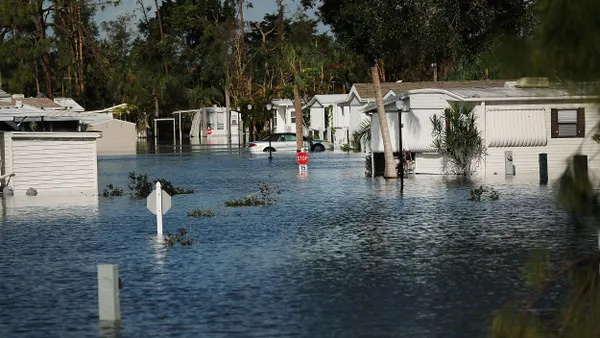Dive Brief:
-
New York City’s Sanitation Department began enforcing mandatory curbside organics separation last week. It has already issued nearly 2,000 summonses since April 1, Gothamist reported. Building owners are penalized if organic waste is found in their waste bins and not separated.
-
The city instructs building owners to place food and yard waste on the curb in a bin that can lock. It delivered about 190,000 free brown bins during the initial launch of the program, the agency reported, while a further 63,000 residents purchased the bins via an official city website.
-
The enforcement program is structured the same as the city’s longstanding recycling program, which mandates separation of metal, glass and plastics. In fiscal year 2024, DSNY issued 51,484 recycling summonses.
Dive Insight:
The city’s organic waste management regime has been in flux for years, but the rollout of the curbside program is a high-water mark for alternatives to disposal. Last year, the City Council also funded an additional community composting program from which Mayor Eric Adams’ administration had previously stripped funding. That program provides independent composters in the city with funding to collect food waste from residents. Advocates hope to obtain even more funding for that program in the next city budget, which is in early deliberations.
Curbside organics collection rolled out first in the boroughs of Queens and Brooklyn. Manhattan, the Bronx and Staten Island began receiving service on Oct. 6.
As collection has increased, so too has the city’s capacity for organics processing. Last year, DSNY announced contracts with WM, Denali Waste Solutions and American Recycling for pre-processing and treatment of organic waste. Those contractors are accepting organics today.
The agency also expanded its composting facility in Staten Island, increasing capacity by nearly 2,000%, according to a city release. As a result, the agency shifted its organics route: 19 waste districts now send their organics to Staten Island, up from three before the expansion.
New York City continues to use a mix of anaerobic digestion and composting to process its organic waste. That includes codigesting waste at the Newtown Creek Wastewater Treatment Plant in Brooklyn, a site that has proved controversial amid operational issues. The facility accepts organics from 20% to 35% of the city’s districts today, and its share of the overall diverted waste tonnage has fallen as more processing capacity has come online elsewhere, per the agency.
From fiscal year 2022 to 2024, the amount of organic material diverted rose 65%, according to DSNY. The agency expects that tonnage will continue to increase as residents become more familiar with the curbside program. Onboarding challenges remain: The city’s public housing authority is reportedly not complying with the organics mandate.
Josh Goodman, deputy commissioner of public affairs and customer experience at DSNY, said the agency wrote roughly 30,000 warnings to residents who had not separated their organic waste from trash beginning late last year. Now residents face fines starting at $25 for the first infraction.
“We were all over the city letting everyone know this was coming,” Goodman said. “Our hope is to never write a single one of these summonses, we just want compliance.”
New York City Council Member Shaun Abreu, who chairs the city’s sanitation committee, said his office had heard from residents of large buildings in particular where property owners had yet to acquire the mandated bins. Abreu said he is working with DSNY to track data on noncompliance and pair enforcement with outreach to property managers.
“Expanding citywide organics collection is a huge step forward, but we need to make sure the rollout actually gets residents to participate,” Abreu said in an emailed statement.
He also called for the city to scale up its financial support for groups like Big Reuse and the Lower East Side Ecology Center that have historically provided building-level training to those looking to voluntarily compost. The two organizations are part of the community composting program and among those looking for support to expand operations in the city.
Abreu’s committee last held a preliminary budget hearing for DSNY on March 25. It’s next holding an oversight hearing on commercial waste zones on April 23.













